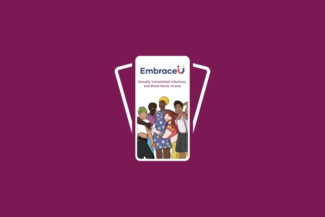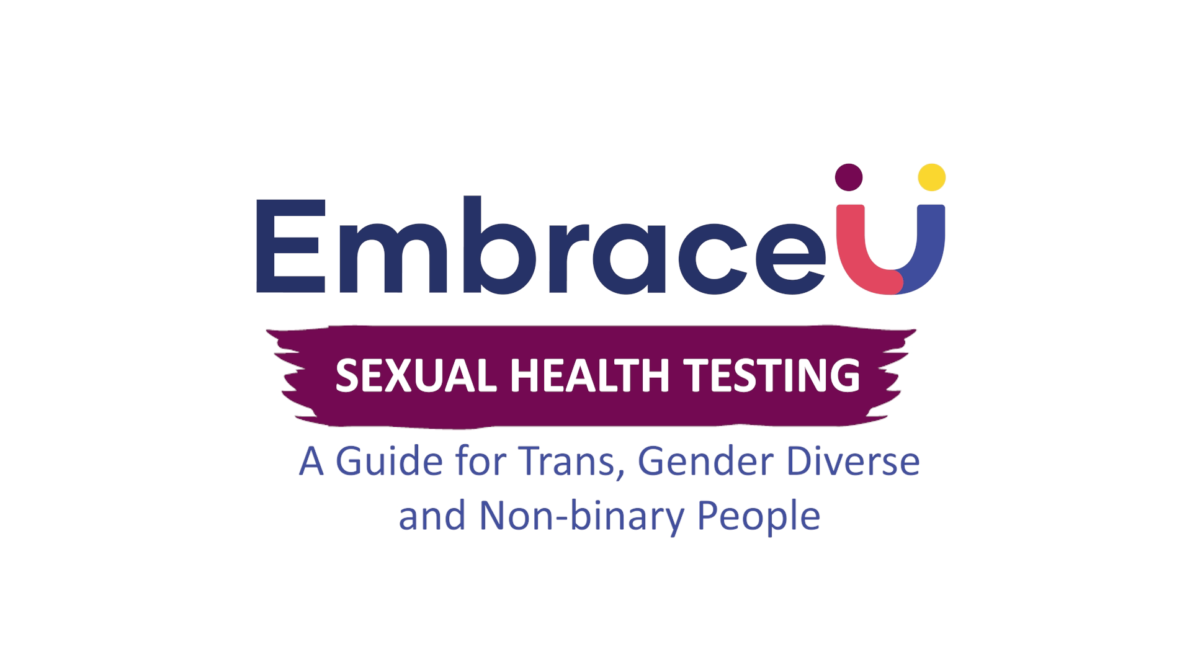Sexual Health Testing
A Guide for Trans, Gender Diverse and Non-binary People
This video provides an example of a sexual health consult with a non-binary person, including discussions of sexual history, body parts and testing for STIs and BBVs.
Video Transcript:
[Bold text indicates text on screen]
[title card]
EmbraceU
Sexual Health Testing
A Guide for Trans, Gender Diverse and Non-binary People
[person enters through sliding doors, the sign on the door says “All ages, all cultures, all genders, all beliefs, all identities, all abilities, all sexualities”]
It is important to find a service you are comfortable with and a health professional you can trust.
[brief shots of a reception area including a painting, brochure display and inclusive posters]
Look out for services that show signs of inclusion and diversity.
[shot of a poster that reads “still here still queer”]
[the person at the start of the video approaches a reception desk]
Receptionist: Hi, how are you?
Client: Good thanks, I’m here for a sexual health screening with Dr Sam.
Receptionist: Sure, what name?
Client: Jo.
Receptionist: One moment Jo, I’ll just have a look. I don’t have a Jo here, is there another name it might be under?
Client: It could be under my legal name, Johanna.
Receptionist: Ok, would you like me to refer to you as Jo?
Client: Yeah, that would be great.
You have a right to be called your preferred of affirmed name.
Receptionist: Here you are, I’ve just got some paperwork for you to do.
Client: Thank you so much.
Receptionist: Thanks.
[blurry shot of the client sitting down to complete the form with text overlaid]
An inclusive form will include space for:
- affirmed name
- pronouns
- gender
If the form is not inclusive, you have a right to let the service know how you would like to be addressed.
If it makes you feel more comfortable, use this letter template to help the health professional understand you better. You can access the template from:
embraceu.shq.org.au [there is an image on screen of the letter template]
[a shot of the client writing on the form]
[a doctor enters the waiting room with a clipboard]
Doctor: Jo?
[the doctor is seated in the consult room speaking to the client]
Doctor: Jo? Hi Jo, my name is Samantha, I’m one of the doctors that work here. Thank you for filling in your paperwork, I’ll go through that in a moment. Because you haven’t been here I just need to get a quick bit of history first.
In an inclusive service you will be asked to confirm:
- preferred or affirmed name
- legal name for Medicare purposes
- pronouns
- the language you use for your anatomy.
You will also be asked standard questions about:
- medications and allergies
- drug and alcohol use
- medical and family history.
Doctor: Can you just confirm your pronouns for me?
Client: They/them.
Doctor: Now I can see from your paperwork that you like to refer to your parts with medical terminology. Now, how would you like to refer to your anatomy?
Client: So, just the top half would just be chest and then medical terminology for the lower half so anus, vulva, vagina, cervix, uterus.
Bodies are diverse and there are many ways to have sex. Be as honest as possible with your health professional so they can make sure you get the tests you need.
Doctor: Now you’re here today to talk about a sexual health checkup?
Client: Yes
Doctor: Do you have any symptoms at the moment?
Client: No
Doctor: And has anyone that you’ve had sex with told you that they’ve got an STI? Is that why you’ve come?
Client: Yes. So one of my partners has just tested positive to chlamydia.
Doctor: And when did you have sex?
Client: We had sex probably 3 weeks ago.
Doctor: Now, in the last six months how many people have you had sex with?
Client: Four.
Doctor: Including that one?
Client: Yes.
Doctor: Now, we’ll start with the person that you’ve had sex most recently with. Now do they have the same body parts as you or different?
Client: The same.
Doctor: And what type of sex did you have with them?
Client: Mostly oral sex.
Doctor: Both ways? Giving and receiving?
Client: Yeah.
Doctor: And any condoms for that?
Client: No. Also sometimes anal sex and sex with sex toys as well as fingers.
Doctor: With the sex toys, are they your own or shared?
Client: They’re shared.
Doctor: They’re shared, ok.
Your health professional will ask you some standard questions relating to blood-borne viruses, including:
- injecting drug use
- tattoos and piercings
- paid sex
- sex overseas.
Doctor: Have you ever injected drugs before?
Client: No.
Doctor: Have you got any piercings or tattoos?
Client: Actually, a couple of weeks ago I got drunk at a party and my friend pierced my nipple in her backyard.
Doctor: Any other piercings of tattoos that you may have?
Client: I got a tattoo a couple of years ago in Mexico on a hostel rooftop.
Doctor: And have you had any hepatitis C testing?
Client: No.
Doctor: Have you ever paid for sex or been paid for sex?
Client: Yes, once a couple of years ago.
Doctor: And was that local or interstate?
Client: That was local.
Doctor: And the same body parts as you or different?
Client: Different.
Doctor: And what sort of sexual practices did you engage in?
Client: Just vaginal intercourse.
Doctor: And any barrier protection for that?
Client: Yes.
Doctor: Do you know if you’ve been vaccinated for hepatitis A, B or HPV?
Client: No, I don’t know about hepatitis but I have been immunised for HPV.
Doctor: No problems and when was the last time you had STI testing?
Client: Yeah, about a year ago but it wasn’t the blood test just the chlamydia, gonorrhoea.
Doctor: Have you ever tested positive for STI before?
Client: No.
If you have a vagina, cervix and uterus, you will be asked questions about:
- bleeding patterns
- contraception
- cervical screening.
Your health professional will discuss ways you can reduce your risk of sexually transmissible infections (STIs) and/or blood-borne viruses (BBVs) including:
- Using condoms and dams
- Taking PrEP and PEP to help protect against HIV
- Getting vaccinated for hepatitis B and some strains of HPV
- Avoiding sharing or re-using injecting equipment such as needles
- Visiting tattoo and piercing places with high safety standards.
And now it’s time to get tested!
- If you have no symptoms, you can do the swabs yourself
- Those with symptoms may be offered a physical exam
- If you’re considered at risk of blood-borne viruses, you may be asked to get a blood test for HIV, hepatitis B and hepatitis C.
[The shot shows a pathology form, swabs and ziplock bag on the doctor’s desk. The doctor picks up the swabs to demonstrate the instructions while speaking]
Doctor: I’ve got yours ready to go and they’re all labelled for the appropriate spot so make sure you’re putting the correct swab in the correct hole. Basically, they are all a cotton tip so for the throat swab pop it into your throat towards the back of your throat, to each side a couple of turns around then back into the tube and it becomes the lid. Similarly with the vaginal swab, couple of centimetres into vagina, couple of turns around and then straight back in and with the anal swab, if you wanted to you can moisten the tip under the tap to start with and then a couple of centimetres into your bottom, a couple of turns around and then straight back in. Pop them in the bag and leave them in the box at pathology.
For health professionals
Information about what each swab is testing for can be found on the letter template at embraceu.shq.org.au [there is an image on screen of the letter template]
Doctor: Do you have any questions about anything that we’ve covered?
Client: No, I think that’s all very clear, thank you.
Your results will take roughly a week. Talk to your health professional about how you will receive these.
It’s a good idea to wait for your results before having sex again.
If you test positive to certain infections, you may need to let your sexual partner/s know.
For more sexual health information and to take the online quiz to find out how often you should get tested for STIs and BBVs, visit:
embraceu.shq.org.au
[credits]
EmbraceU
Developed in partnership by SHQ, WA AIDS Council and M Clinic
Supported by TransFolk of WA, in consultation with trans, gender diverse and non-binary community members
Starring Hanna Saltis and Dr Sam Johnson
Filmed and edited by Stevie Lane
Sponsored by Government of Western Australia Department of Health
Copyright Family Planning Association of WA (Inc.) August 2021
Related Resources
Letter template for health appointments
Downloads, Medical

Testing information for health professionals
Medical, Professionals

Sexually transmitted infections and blood-borne viruses brochure
Downloads, Medical

Language Guide: Sexual health, STIs and BBVs for trans, gender diverse and non-binary people
Downloads, Language, Professionals

